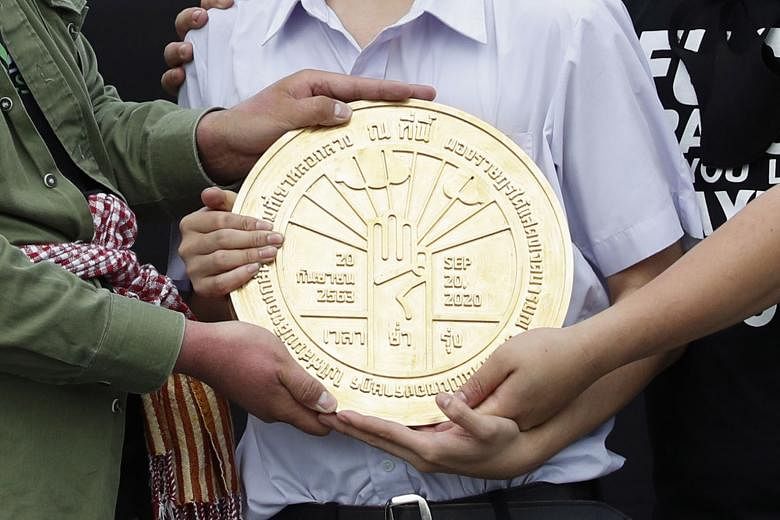BANGKOK • A plaque placed by Thai protesters to declare that Thailand belongs to the people and not the king was removed from near the Grand Palace in Bangkok overnight and police said yesterday they may charge those behind the symbolic gesture.
The plaque was cemented in place on Sunday after a rally by tens of thousands of people who cheered calls for reforms to the monarchy of King Maha Vajiralongkorn, the latest challenge since activists broke a longstanding taboo on criticising the country's royal family.
Police said the plaque had been handed over by officials from the Bangkok city authority and the government's Fine Arts Department. An officer said it was "to keep as evidence to press charges against protesters".
Protesters voiced little surprise that the brass plaque had been removed after less than a day.
Protest leader Parit "Penguin" Chiwarak told reporters that an electronic file of the plaque was being shared to enable people to make more of them and place them wherever they want.
"The plaque was already placed in the hearts of people. You may remove it but we will make a new one," he said.
The almost-immediate removal of the plaque reflects that "arch-royalists are not only incensed by demands for monarchical reform but are also not going to put up with any symbols that even reflect opposition to the palace", said Dr Paul Chambers of Naresuan University.
Protesters have grown ever bolder during two months of demonstrations against Thailand's palace and military-dominated establishment.
Criticising the monarchy is illegal under lese majeste laws, but recent arrests of more than a dozen activists - including Mr Parit - were made on other grounds. All have since been released on bail.
Sunday's demonstration was the biggest since the 2014 coup that brought Prime Minister Prayut Chan-o-cha to power.
Protesters have called for his removal, a new Constitution and elections, as well as for royal reforms.
Yesterday, Mr Prayut welcomed the fact that the protest was peaceful. "Nation, religion and monarchy are the upmost pillars of the Thai people," he told reporters.
The demonstrators say the Constitution gives the king too much power and that it was engineered to allow Mr Prayut to hold on to power after last year's election. The Prime Minister says that vote was fair.
The symbolism of the plaque is its resemblance to the one that had commemorated the end of absolute monarchy in 1932 and which was removed from outside a royal palace in 2017, after King Vajiralongkorn took the throne.
The plaque says "this country belongs to the people and is not the property of the monarch as they have deceived us".
Mr Craig Kunakorn, 33, a barber who was at the protests, yesterday visited the spot where the plaque had been cemented into the ground. "Everyone knew it would disappear soon but the success of creating it is something that will continue. It is still an important symbol," he said.
REUTERS, AGENCE FRANCE-PRESSE

